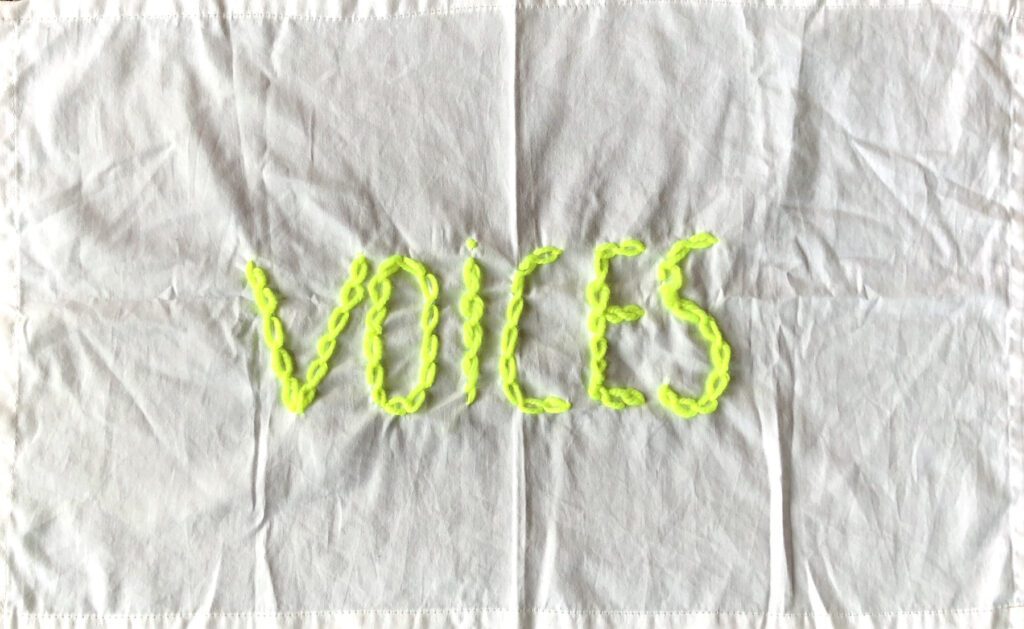The Museum of African Contemporary Art Al Maaden (MACAAL) , Marrakech, Morocco
23 Feb 2019 - 22 Sep 2019

Owanto, Voices (from Pardonne moi project) 2018 Embroidery on cotton fabric 37 x 60 cm Courtesy of Owanto Studio
One Thousand Voices will be included in The Museum of African Contemporary Art Al Maaden (MACAAL) group exhibition, Material Insanity, from the February 23rd to September 22nd, 2019.
Curated by Meriem Berrada and Janine Gaëlle Dieudji, the exhibition invites the critical analysis of the past and present societies by accentuating the practice of contemporary artists as well as exploring the act of re-materialization as an art of combat, in response to widespread cultural devaluation in a digital era. Raging from tactile objects, tapestries and installation composed of industrial materials, the works in the exhibition Material Insanity create an equilibrium between form and meaning, advancing the resonance of material as content.
One Thousand Voices will be exhibited with the series Pardonne-Moi, produced in collaboration with reformed-cutters from the Kolda region in South Senegal. These women, who have abandoned the knife to adopt the needle, are changing their destiny as they weave the words of liberation voiced by the heroines in One Thousand Voices. In this exceptional act of solidarity (which takes place over the course of 3 months, ex-cutters have embraced a new skill, gained a new source of income) these women are united. There is the notion of healing on the one hand and the notion of pardon/atonement on the other. In this immersive sound installation, Pardonne-Moi finds its place, as the use of a new medium (material and embroidery/needle instead of knife) is explored, as well as the relationship between the spoken and the written word.
The neon piece entitled What happened, happened, happened, happened hangs within the space, bringing to light the voice of an FGM survivor. The enlightened words offer a way out from the shade/darkness, a departure from the patriarchal regime perpetuated by matriarchal societies.
One Thousand Voices is a collection of audio testimonies from Female Genital Mutilation/Cutting survivors (FMG/C). Using various languages, some speaking anonymously, most testifying openly, this installation projects sounds and stories of survival and strength derived from cutting. The voices weave together to create one collective story.
This ensemble brings to light the complex issues surrounding FGM/C. The mélange of voices, accents, and languages emerge from 27 countries in Africa, parts of the Middle East, Asia, and the ever-growing diaspora, and tackle the very taboos that often leave others silent.
The piece is composed like a symphony —voices are recorded on a smartphone and sent via WhatsApp– with several movements, elements and choruses. The monotonous crackling undertone of a broken record alludes to the coming of a new age – as said in the french idiom “change de disque!” which translates to “change the record!”. The weaving of analogue and digital creates a bridge between the past and present, linking the visual images from the past (Flowers Series) with the sound images from the present (One Thousand Voices).
For the artist it is vital to weave the past with the present, the analogue with the digital, the artistic with the journalistic. While the flower poetically plays a healing role and attempts to metaphorically change the narrative in Flowers Series —from victims to heroines— the collective voice of women and girls united to say “no more” in One Thousand Voices breaks the silence and literally changes the narrative.
Artist Statement
“It all started with found photographs of a female circumcision ceremony hidden in a forgotten drawer. One of these photographs, La Jeune Fille à La Fleur from Flower Series, now hangs on the wall of the second floor of the Zeitz MOCAA and is part of the permanent collection. It stands as a symbol for change. The second series One Thousand Voices, an immersive sound installation where survivors share their stories irrespective of geography, age, colour, religion, or culture, will be heard at The Zeitz Museum of Contemporary Art Africa, Cape Town, and The Museum of African Contemporary Art Al Maaden (MACAAL), Marrakech in February 2019. While the photographs are a point of departure for the exhibition at Zeitz MOCAA, MACAAL will be presenting the work in collaboration with reformed cutters who have abandoned the knife and who are now using the needle in a third series, Pardonne-Moi, to materialize the voices of survivors and to make amends.”
– Owanto
About Owanto
Owanto had the honour of representing the Republic of Gabon at the 53rd International Art Exhibition of the Venice Biennale in 2009, with a solo show in the first-ever Pavillon du Gabon, curated by Fernando Francés, Director of CAC Malaga, Spain. She was the first artist from sub-Saharan Africa to have solo exhibition in a National Pavilion at the Venice Biennale.